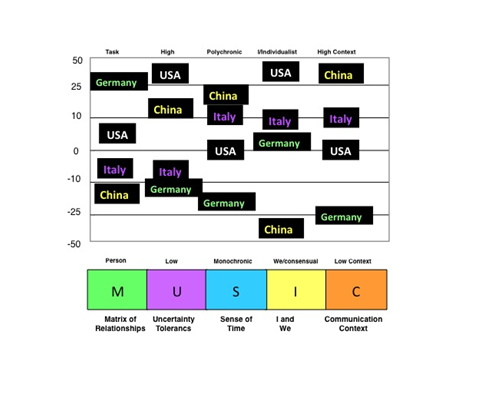
The MUSIC Intercultural Model
Since 1996 THE BRIDGE has been working with global organisations and seen the business benefits of increased intercultural understanding. Improved communication, better project planning and above all, an increase in trust and productivity . Our Cross Cultural Effectiveness programme dramatically increases a person’s tolerance and understanding of different cultural values and norms, thereby increasing trust and motivation in the team.
How we communicate, through our body language, spoken word and what we leave unsaid, varies more in culture than it does in language. The potential for misunderstandings and wrongly judging others lies at the heart of this program. To establish a person’s cultural profile, each attendee completes a psychometric test, with the information gathered from the delegates THE BRIDGE analyses the data with our MUSIC Intercultural Model to establish differing cultural norms and the impact on communication styles, decision making, speed of operation and values. Against the scales of the MUSIC Intercultural Model we are able to process the data and structure a program/workshop or event to address possible issues in teamwork caused by differing cultural norms.
The MUSIC Intercultural Model breaks behaviour down into five key dimensions, namely:
- Matrix of Relationships – This determines the kind of relationship a person has with someone and what is needed in business to build rapport and trust to be seen as a competent business partner.
- Uncertainty Tolerance – When do you have enough information to make a decision? When do you ‘know’ that something will work? In many international projects, we have heard from delegates differing opinions of what’s “good enough” and the cause of conflict and misunderstandings. Having an empathetic approach to a person or a business cultural value will mitigate communication errors and potential conflicts.
- Space and Time – The easiest value to spot, and the easiest to underestimate! Differing value associations around time can stop trust from being developed in teams and become a real inhibitor to success.
- I and We – The way in which a person approaches “success” varies around the world. Should I work as an individual and stand out from the crowd, or work as part of the team for the success of the team?
- Context – The directness of communication, the emotional content and the use of inference varies dramatically across the globe. An ability to understand the intent behind the message and react with the appropriate level of clarity and emotion is the core of this area.
By combining the meta profiles shown above with the individual’s results from the psychometric test, a clear picture of the cultural ‘fit’ is established. The Matrix highlights areas where the individual needs to modify behaviour in order to be perceived in a positive way. We have used cultural profiling in global teams and also for individuals who are moving from one culture to another, in order to help them understand some of the stereotypical judgments that they may encounter and some of the communication challenges that they may have.
THE BRIDGE has been compiling cultural business data (work in progress) from over 20 countries since 1991, enabling us to provide a reliable platform for understanding cultural drivers and the impact the drivers have on business effectiveness. The Cross Cultural Effectiveness program enables individuals, teams and organisations to identify their own cultural assumptions and minds set and develop strategies for working effectively in a global context. We provide a wide range of cross-cultural training programmes, from general cross-cultural awareness to country specific effectiveness and cross-cultural team coaching. Our experienced cross-cultural practitioners’ bring real-life experience and insights into each training program.
Contact us for more information on how the MUSIC Intercultural Model © can help your business become more successful on the global stage.
Veiw the full document here MUSIC Intercultural Model